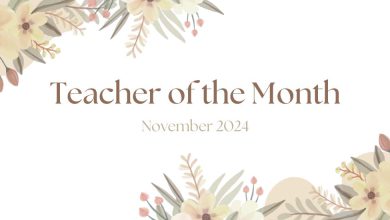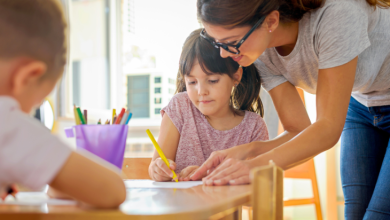Wondering What to Look for in a Preschool?

Wondering What to Look for in a Preschool?
Choosing a quality preschool is one of the most important decisions you’ll make for your child.
Early childhood education plays a seminal role in cognitive, social, emotional and physical development. It prepares young learners for long-term academic and life success.
But what should you look for when researching preschools in your area? Professor Deborah Stipek, former Dean of the Graduate School of Education at Stanford University and an expert on early education, recommends four basic criteria for selecting the best preschool:
- Quality teaching
- Classroom environment
- Attention to student performance
- Student-staff interactions
Let’s take a closer look at these criteria to guide your own preschool search.
Quality of Teaching
Teacher qualifications help to separate a preschool from a daycare center. Here are some indicators of teacher quality you’ll want to look for.
- What are the required teacher credentials? Quality preschools, such as Little Sunshine’s Playhouse & Preschool®, go beyond minimum licensing requirements to provide ongoing training that continually builds classroom management skills, including age-appropriate activities, effective discipline and positive communication.
- Ask how long teachers have worked at the school. What is the teacher turnover rate? Does the school conduct background checks?
- Teachers should use purposeful activities. Is the teacher able to clearly explain the specific learning goal for every assignment? Building a tower using blocks, for instance, introduces preschoolers to basic physics and teaches cooperation with others.
- Teachers who are knowledgeable in child development understand how to work with varying attention spans. When visiting a preschool classroom, Stipek recommends taking a look at the art projects on display. Ask yourself, “Are they all a little different?” The answer should be, “Yes.” Developmental psychologist Jean Piaget revolutionized the child development field with his expansion on cognitive development. By creating and giving choices to children, in this case art, children are able to learn and expand on the process instead of focusing on the outcome of the final product. With focus being on the process instead of the final outcome, children are able to find out what works, what doesn’t work, and create and cater to their imagination. In turn, the child often creates his or her own “masterpiece” which promotes healthy self-esteem.
Classroom Environment
Little Sunshine’s Playhouse® implements a proprietary Creatively Shine™ curriculum, which holds that the preschool classroom is a child’s “third teacher,” in addition to parents and teachers.
- What’s the overall atmosphere? When touring a preschool, you should be allowed to see all of the classrooms. Do teachers and children look happy? Is there excessive crying? Do teachers respond appropriately when a child is crying?
- Activities should be readily accessible. Look for low tables and shelves where it’s easy for young learners to reach crayons, pencils, paper, toys and other items.
- Safety should be a priority. Check for rounded furniture corners, covered electrical sockets and dangerous items kept out of reach. Is the playground inspected for safety on a regular basis? Are staff members certified in CPR and basic First Aid?
- Pay attention to security. Each parent at Little Sunshine’s Playhouse® receives a door code. The school also maintains an authorized pickup list with photo ID verification.
Attention to Student Performance
Preschool learning should prepare your child for the rest of his or her academic career. Look for a program that develops the skills needed to succeed over the long term.
- Ask to see the school’s curriculum. One of the most important distinctions between a preschool and a daycare is that a preschool has a curriculum. An effective curriculum is one that promotes cognitive, social and emotional learning and develops independent skills.
- Ask how the school measures development. For all outcomes described in the curriculum, the preschool should have a measurable, documented standard for measuring every child’s progress.
-
- Developmental traits to measure include self-esteem, following directions, persistence and fine motor skills.
- Social skills include taking turns, impulse control and cooperation.
- Academic skills include identifying letters and numbers, counting, identifying shapes and learning to hold a book.
- Preschool teachers should also be trained to notice possible signs of developmental delays, learning disabilities and health problems, so that children can receive early assessment and intervention.
Student-Staff Interactions
Pay attention to how teachers interact with the children, and how the children respond. As noted above, teachers and students alike should seem happy, which helps to create an overall positive atmosphere.
- Do teachers know how to listen? If a child draws a picture, rather than proclaiming “That’s so pretty!” a good teacher will ask an open-ended question such as “Tell me about this.” Giving kids the chance to describe what they’re doing and why helps to build verbal skills and understanding of concepts.
- Do teachers make eye contact with students? It’s best for teachers to interact with students on the children’s eye level. That means kneeling or sitting down to talk to them. Good eye contact encourages kids to talk longer, which further develops language ability.
- Do teachers encourage interaction? Project-based assignments, like those at Little Sunshine’s Playhouse®, promote cooperation and discussion between students. Look for children choosing to play together during recess. If two students disagree, say, over who was first in line or how to complete an activity, teachers should first monitor the conversation to see if the kids can resolve the matter through discussion, ready to intervene if necessary.
- Do teachers provide appropriate care when needed? Preschool teachers must be prepared to take on some parent-like roles during the school day. These might include First Aid for skinned knees and other minor injuries, help with shoe tying and tending to the occasional bathroom accident.
Are you looking for information on preschool programs in your area? Find a Little Sunshine’s Playhouse® location near you to learn more about our outstanding teachers and Creatively Shine™ curriculum.





